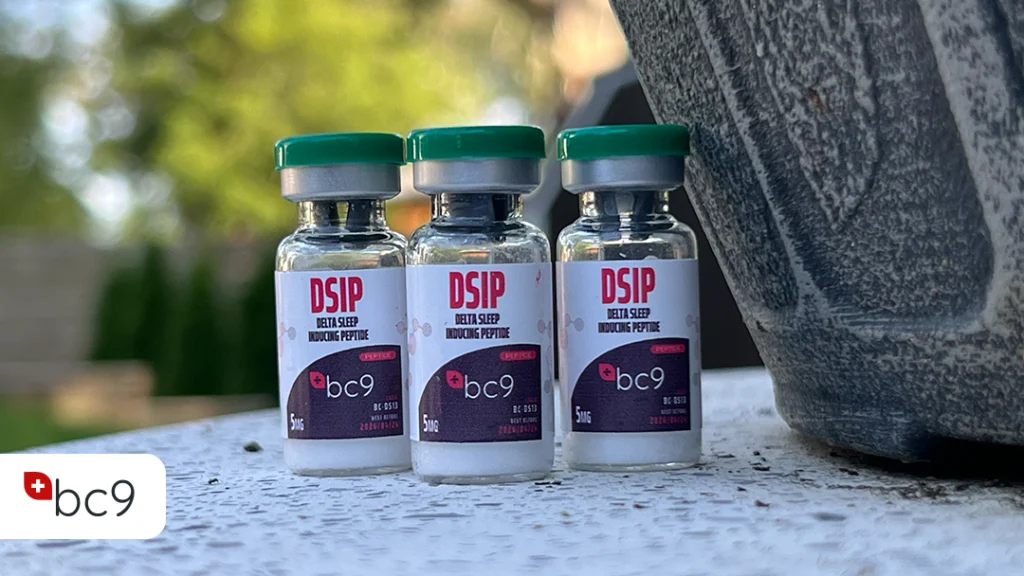DSIP (Delta Sleep-Inducing Peptide) is a neuropeptide first detected in a rabbit’s brain in 1963. In 1977, the peptide was isolated from cerebral venous blood for the first time. Subsequent research has shown that DSIP is normally synthesized in the hypothalamus.[R]
Today it is mostly being researched for its potential to improve natural deep delta EEG sleep. Although the exact method of action is yet to be determined, it is apparent that DSIP has many modulatory effects on the central nervous system (CNS). Apart from its amazing effects on sleep regulation and induction, it also has noteworthy impacts on the circadian rhythm.
DSIP has been heavily studied for over 40 years. It has also been shown in research to improve hormone levels and physical performance. In this blog post, we will provide an overview of DSIP benefits to help clear any misconceptions you might have.
DSIP Peptide Benefits

Effect on Delta Sleep
Delta sleep, also known as slow-wave sleep (SWS) or deep sleep, is a crucial stage of the sleep cycle. It is characterized by slow brain waves called delta waves. This stage is the most restorative part of sleep and typically occurs in longer periods during the first half of the night. [R]
Delta sleep-inducing peptide got its name because of its delta-wave (-sleep) increasing effect. This effect was first observed in rabbits and later reported in rats and mice. Delta waves are the slowest recorded brain waves. They are associated with the deepest levels of restorative, healing sleep. [R][R]
A preclinical study seems to support this. The study reported a significant increase in slow wave sleep (SWS) in cats following DSIP administration. SWS consists of stage three of NREM sleep and usually lasts between 70 and 90 minutes. The human body is at its most restful during this stage of sleep. [R]
Interestingly, a pilot study investigated the sleep-inducing capacity of DSIP in humans. It found the neuropeptide produced enhancements in non-REM as well as REM sleep. REM sleep is a stage of sleep during which your eyes move around rapidly. It is associated with dreaming and memory consolidation. Researchers have proposed that abnormalities in NREM sleep may play a role in Alzheimer’s and Parkinson’s disease. [R][R][R]
Lastly, in a preclinical study that involved cats as test subjects. DSIP produced a more pronounced increase in rapid-eye-movement sleep. [R][R]
Learn more by following the BC9.co.
Delta Sleep-Inducing Peptide and Insomnia
DSIP injections (30 nmol/kg body weight) enhanced sleep time by 22.5% over baseline in a double-blind, placebo-controlled research. This treatment increased sleep efficiency by 26.8%. It also reduced sleep latency and awakening after sleep onset by 53% and 45%, respectively. [R]
An additional study looked into how DSIP treatment affected people with persistent insomnia. In comparison to the placebo group, the DSIP group was said to have better sleep efficiency and shorter sleep latency. One measure of subjectively estimated tiredness decreased within the DSIP group. [R]
To support this, a separate insomnia study was conducted. It reported that 6 out of 7 patients with severe insomnia had normalized sleep after receiving 10 DSIP injections within 14 days. [R]
Delta Sleep-Inducing Peptide and Narcolepsy
Narcolepsy is a chronic neurological disorder where your brain cannot control your ability to stay awake or fall asleep. People with narcolepsy can fall asleep anywhere, anytime, without clinical or laboratory signs. [R]
A DSIP study was conducted on a male narcoleptic. The sleep-inducing peptide was injected repeatedly, either in the morning or the evening. The results were linked to increased activity during the day. Additionally, the frequency of sleep attacks decreased while performance throughout the day increased. [R]
Delta Sleep-Inducing Peptide and Drug Abuse
In a clinical investigation, DSIP-injected IV therapy was found to be successful in treating 97% of opiate addicts and 87% of alcoholics. Significantly, the treatment was considered superior to the usual withdrawal treatments. [R]
Other DSIP Indications
In addition to the above-mentioned indications, DSIP proves to have numerous potential benefits. It may be a promising tool for stress, blood pressure regulation, and pain management. This makes DSIP so much more than a potential treatment aid for sleep disorders. With its exceptional properties and effects, it will certainly be the subject of further research.






